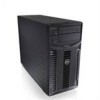Dell PowerEdge T410 Hardware Owner's Manual - Page 107
Mode-Specific Guidelines, For Memory Mirroring or Advanced ECC Mode, the socket furthest - mix quad rank with dual rank
 |
View all Dell PowerEdge T410 manuals
Add to My Manuals
Save this manual to your list of manuals |
Page 107 highlights
• For Memory Mirroring or Advanced ECC Mode, the socket furthest from the processor is unused and memory modules are installed beginning with socket A1 or B1 and proceeding with socket A2 or B2. • Advanced ECC Mode requires memory modules that use x4 or x8 DRAM device widths. • The memory speed of each channel depends on the memory configuration: - For single or dual-rank memory modules: • One memory module per channel supports up to 1333 MHz. • Two memory modules per channel supports up to 1067 MHz. - For quad-rank memory modules: • One memory module per channel supports up to 1067 MHz. • Two memory modules per channel are limited to 800 MHz, regardless of memory module speed. • If quad-rank memory modules are mixed with single- or dual-rank modules, the quad-rank modules must be installed in the sockets with the white release levers. • If memory modules with different speeds are installed, they will operate at the speed of the slowest installed memory module(s). Mode-Specific Guidelines Three memory channels are allocated to each processor. The number of channels and allowable configurations depend on the memory mode selected. Advanced ECC (Lockstep) Mode Support In this configuration, the two channels closest to the processor are combined to form one 128-bit channel. This mode supports SDDC for both x4- and x8based memory modules. Memory modules must be identical in size, speed, and technology in corresponding slots. Installing System Components 107















